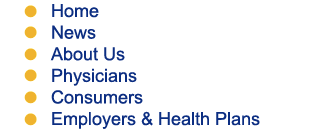*NCQA
PPC Version 2 is now available*
Click
here to learn more
The
Bridges to Excellence (BTE) initiative is comprised of three
individual programs, each of which is designed to promote
and reward physicians for improving the quality of patient
care:
Physician
Office Link (POL): rewards office practices for the
use of systematic information to enhance the quality of
patient care.
Diabetes Care Link (DCL): rewards physicians
for demonstrating good outcomes in diabetes care.
Cardiac
Care Link (CCL): rewards physicians for demonstrating
good outcomes in cardiac care
Physicians
who demonstrate high levels of performance in these program
areas are eligible for incentive bonuses paid by participating
purchasers. Each of the three programs has its own rewards
and performance criteria.
To obtain the rewards
offered under the Bridges to Excellence programs, physicians
must demonstrate high levels of performance in the three BTE
program areas by passing specific performance measurement
criteria that are administered by the National Committee for
Quality Assurance (NCQA).
Physicians who pass NCQA's performance criteria and obtain
the rewards offered through the BTE rewards programs also
will be listed on the Bridges to Excellence web site, to publicly
recognize their achievement.
More detailed information
regarding the specific physician rewards available under the
POL, DCL, and CCL programs, as well as information regarding
NCQA's performance assessment programs, can be found under
the links to the left.
NCQA
Physician Practice Connections Version 2 Standards
On January 31,
2006, NCQA released Physician Practice Connections Version
2 (PPC v2) to the public.
PPC v2 will not
impact the current BTE pilot markets of Boston, MA and Capital
Region NY; the current physician recognition and application
process will stay the same until the end of the BTE pilot
on 7/24/06.
Bridges to Excellence
is supporting the use of the new PPC v2 standards in all future
markets and will work to transition from v1 to v2 in current
markets upon completion of the pilot phase.
There are 9 modules
in PPC v2:
PPC
1 - Access and Communication
PPC 2 - Patient Tracking and Registry Functions
PPC 3 - Care Management
PPC 4 - Self Management Support
PPC 5 - Electronic Prescribing
PPC 6 - Test Tracking
PPC 7 - Referral Tracking
PPC 8 - Performance Reporting and Improvement
PPC 9 - Interoperability
Each of these modules
has 3 possible levels of element completion:
- Basic
elements assess the use of evidence-based standards of care,
maintenance of patient registries for the purpose of identifying
and following up with at-risk patients and provision of
educational resources to patients.
- Intermediate
elements ask whether practices use electronic systems to
maintain patient records, provide decision support, enter
orders for prescriptions and lab tests and provide patient
reminders.
-
Advanced
elements ask whether a practice’s electronic systems
interconnect and whether they are “interoperable”
with other systems, whether it uses nationally accepted
medical code sets and whether it can automatically send,
receive and integrate data such as lab results and medical
histories from other organizations’ systems.
Individual markets will determine the reward schedule that
corresponds to the number of passed modules and the level
at which the elements in each module are passed.
Individual markets
will determine the reward schedule that corresponds to the
number of passed modules and the level at which the elements
in each module are passed.
For POL rewards, BTE recommends the following reward schedule:
Basic recognition in PPC constitutes eligibility for $15 in rewards per patient per year.
For Intermediate recognition it is $30 and for Advanced it is $50.
For a comparision
of PPCv1 requirements to PPCv2 requirements, download
this chart (57kb MS Word Document).
For more information
about PPC v2, please visit NCQA's website at www.ncqa.org/ppc/.



